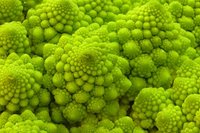Food for thought... literally.
 Let's spend Friday evening talking about the universe, as explained by food. OK? Super. Here goes:
Let's spend Friday evening talking about the universe, as explained by food. OK? Super. Here goes:
"Fractal forms--complex shapes which look more or less the same at a wide variety of scale factors, are everywhere in nature. From the fluctuations in the cosmic microwave background radiation to the coastlines of continents, courses of rivers, clouds in the sky, branches of plants and veins in their leaves, blood vessels in the lung, and the shape of seashells and snowflakes, these fractal or self-similar patterns abound... some of the most pleasing patterns in geometric art exhibit exact or almost exact self-similarity. These are patterns which are composed of smaller copies of themselves ad infinitum, or at least until some limit where the similarity breaks down due to the granularity of the underlying material."
What does all this mean? Well, here's a visual, edible example. The Romanesco Broccolli/Cauliflower:  This little bugger looks the same in super-zoom mode as it does to the naked eye. This is an example of a fractal form -- though they abound. What makes this really cool is that it is, in essence, a physical representation of a mathmatical equation -- a computation. What's crazy is that there are theories out there explaining the universe based on this computation; modern thinkers seem to like applying this computation to describe forms on our planet.
This little bugger looks the same in super-zoom mode as it does to the naked eye. This is an example of a fractal form -- though they abound. What makes this really cool is that it is, in essence, a physical representation of a mathmatical equation -- a computation. What's crazy is that there are theories out there explaining the universe based on this computation; modern thinkers seem to like applying this computation to describe forms on our planet.
"It seems like the universe just wants to compute. Of course, there's a tendency for thinkers in every age to model the universe in terms of the predominant technology of the day. To the Pythagoreans, all was number and geometry. In Newton's time, the universe seemed an intricate clockwork mechanism. Later, in the age of steam, thermodynamics and heat death dominated models of the universe. Today, surrounded by computers evolving more rapidly than anything in natural history, what could be more natural than regarding the universe as a great automaton performing some kind of cosmic computation?
And yet, there may be some truth in that viewpoint, and insights to be had by pursuing it, just as earlier worldviews provided frameworks for further discoveries. Stephen Wolfram's A New Kind of Science and Rudy Rucker's forthcoming The Lifebox, the Seashell, and the Soul (excerpt) argue that many of the processes we see in nature are indeed computations."
Very cool. And from a social perspective, isn't it true that we're routinely both both enlightened and blinded by our own experiences, which are the parameters with which we define our own existance and response to our unique world? This is proof that even the most intelligent people on the planet have a difficult time seeing the view for the window.
Have a good weekend!

4 comments:
Ranting is good. I'm interested first in the philosophical question these theories beg (as they are theories), and second in the science and math behind them.
I like the thought of patterns and find them impressive, but am also dissapointed and bored by them.
If I read that book, you're the first person I'll let know. But don't hold your breath... I've got some fantastic fiction to rot my brain on first!
Well, I made the order. I figure since I am the one who started you on this journey..yeah, I'm stealing your thunder, I might as well be the one to blow your mind with it. In a few days/weeks, I am going to place in your hands the KCTS special on DVD that got me interested in this whole deal. Its gonne be awsome.
Ladies and gentlemen: DAVE. First got me hooked on two things I'll probably never understand -- Fractals and String Theory.
Oh, and also The Republic.
And hookahs. Damn...
And it's only the begining. I have plans for you kid. Oh do I have plans for you.
Post a Comment